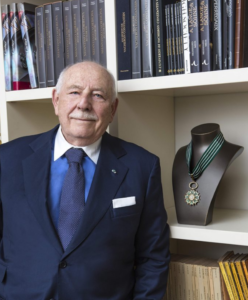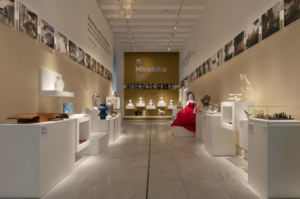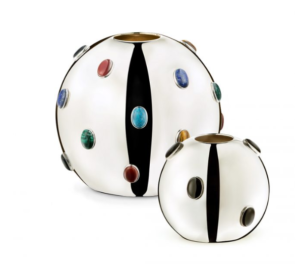
The name Franco Cologni is a symbol of excellence and successful Italian entrepreneurship all over the world. President of Fondazione Cologni dei Mestieri d’Arte, which he founded in 1995 in Milan, Cologni promotes several initiatives especially addressed to the young, with the aim of protecting and supporting the new generations of craftsmen, artistic excellences in the manufacturing sector. He has also founded the Creative Academy, international school of Design and Creative Management, and he is co-founder, together with Johann Rupert, of the Michelangelo Foundation for Creativity and Craftsmanship, which is an international organisation based in Geneva, whose commitment is directed to the celebration and promotion of craftsmanship, through the creation of employment and the concrete support to culture. Always in Geneva, Franco Cologni is the founder and President of the Cultural Committee of Fondation de la Haute Horlogerie. For the projects and the brilliant results achieved during his career, Cologni deserved numerous recognitions: the value of entrepreneur was rewarded in 2002, in Italy, with the appointment as Cavaliere del Lavoro, while in France he was awarded as Chevalier de l’Ordre National du Mérite, Commandeur de l’Ordre des Arts et des Lettres, and Officier de la Légion d’Honneur. In 2017, he received the Andrea Palladio International Jewellery Award for the category ˝The Lifetime Achievement Award˝, in honor of the indispensable contribution that Cologni has offered to the world of jewellery and goldsmithing, by opening new horizons and leaving an indelible mark on the industry.

His excellent career begins at Università Cattolica of Milan. “My family wanted me to be a lawyer. I enrolled in the Faculty of Modern Literature, and from then on I immediately began to be interested in culture, arts and crafts”. Cologni recalls his university years and the crucial meeting with Paolo Grassi, who founded the Piccolo Teatro of Milan together with Giorgio Strehler in 1947. “From this moment on I decided to specialize in History of Theatre and Entertainment, and then I graduated with a thesis on Ugo Betti, Italian poet and playwright”. Later, he became editor for Avvenire, specialised in theatre and entertainment. “I was young, I had a strong passion and a lot of energy. I would attend all the premières at La Scala. I could write about plays even before watching them, but my interest, besides the opera, was to observe and understand the audience’s reaction. I just got married, and my wife would often complain about my absence”. In the ‘70s, Franco Cologni had another important meeting with Robert Hocq, the inventor of the first Cartier oval briquet. “It was the beginning of his luck and also mine. From that moment on I began to follow the wonderful story of Cartier, a company with which I collaborated for forty years, till the incorporation of the brand into the Richemont Group”, group inside which Franco Cologni had very important international positions, and inside which he’s still present today as Advisor and expert of jewelry and horology.
“What is the meaning of excellence?” I asked, aware of asking such a question to a great entrepreneur who has dedicated his life to excellence. “Excellence – says Cologni – is excellence. The word comes from Latin excellentia, and its whole semantic field refers completely to the essence of this word: uniqueness, originality, authenticity. These values are universal. Then, there is the poetic excellence, which becomes poetry, but for this one the poet himself is not enough, you need someone to listen. Excellence is the result of an encounter, of knowledge, experience, love at first sight which is transformed into real love by time and dedication.” “To identify excellence in craftsmanship – he continues – the true challenge and the thermometer to measure it, is the secret of knowing how to create well. The artisan works with his hand, but also with his head, with wisdom. The very word artisan comes from art. He is the creator of beauty, he knows how to shape beauty. Great expertise is needed”. In the exhibition Mirabilia, in the series entitled “Mestieri d’Arte & Design. Crafts Culture” held at the Quadreria of Triennale Milano, Cologni demonstrated his deep conviction about the importance and current relevance of high craftsmanship. Through a Wunderkammer of objects skillfully made by artisans, Milanese Masters.

Objects that, for their craftsmanship, authenticity and creativity, amaze and astonish the audience. “Unfortunately, nowadays, less consideration is given to arts and crafts, especially among young. When I created Fondazione Cologni, only a few people knew what arts and crafts were. Undoubtedly, it took many years for this to be understood. Today we have achieved important results, but we need to continue on this path and always give new strength to an industry that is so fascinating and fragile at the same time.”

The artistic process, explains Cologni, “is born, first of all, in the workshop. It starts with the training.” In this regard, he compares the reality of a young graduate with that of a young craftsman or specialised professional. “Both paths have great value. They are certainly different: on the one hand, there is economic vocation, on the other hand, creative vocation. Sometimes creativity leads to have less profit, but a great success, and it allows to discover a unique reality. This is artistic craftsmanship. However – he continues – education is crucial, but it is not enough on its own: first of all, a young artisan must be willing to devote time, patience, research and experimentation to his work. The secret of a successful artisan is to find something that doesn’t exist yet and physically make it. And then there must be passion, because passion is the secret of life”.

The greatest satisfaction for Cologni happened in 1995 by creating Fondazione Cologni: “the creation of a Foundation dedicated to Métiers d’Art was the spark which allowed me to transform my dreams and desires.” Franco Cologni’s advice to young who wish to undertake the path of arts and crafts is to develop a strong personality and deepen the emotional element of their creations. The latter “is not love at first sight, but an act of real love. Undoubtedly, it is a starting point, but then it becomes a choice, to be carried throughout life. The young have great chances but they must be authentic, believe in what they do and be patient. It is important not to be dragonflies, but hardworking bees”. Cologni concludes with a message of hope: “since the human being has existed, the seek for beauty has always accompanied him. Therefore, anything could happen, but the artistic craftsmanship will continue to live, always.”

